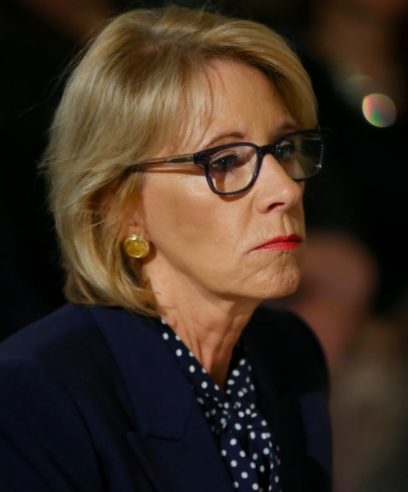The DeVos Resignation

January 22, 2021
Betsy DeVos has resigned from her position as United States Secretary of Education. Even though she’s gone two weeks earlier than expected, it’s almost satisfying to see her go early: to use a metaphor far more saccharine than the situation deserves, it’s like watching the dead leaves falling from the tree that is the disastrous Trump administration. Her resignation in the wake of the violent protests on the Capitol means nothing– too little too late from a person who did too much damage while she had the chance. In the words of Senator Elizabeth Warren, as well as the American Teachers’ Federation “Good riddance.” To quote Senator Bernie Sanders, “You won’t be missed.”
The Secretary of Education is an unassuming position, rarely addressed in the headlines. But the person who holds that office supposedly represents and acts in the benefit of the approximate 50.8 million K-12 students in public schools, 19.9 million college students, 3.3 million public school teachers, and the countless bus drivers, food staff members, custodians who all participate in the US school system each year. It’s the education secretary’s job to advise on, lobby, and execute legislation surrounding education, as well as overseeing the distribution of federal funding to schools. Additionally, the influence of an Education Secretary is enormous in their sphere– while the federal government has no power to dictate the curriculum of schools, Arne Duncan (the Obama administration’s Education Secretary), had enough influence to get Common Core put in place in 42 states.
So who exactly is Betsy DeVos? What was her platform such that protesters physically blocked her from entering a middle school before her first appearance? Such that Senator Elizabeth Warren and Representative Katherine Clark openly scorned her to the point of compiling a “DeVos Watch” Report in 2018, cataloguing how they felt she failed American students?
What credentials she bears that could possibly make her eligible as a Secretary of Education are unclear. Her main pastimes seem to be being rich (the 88th richest family in America!) and investing in a Clockwork Orange-esque biotherapy known as Neurocore. Her platform is simpler: she fights for “school choice,” particularly the rights of parents to send their children to religious schools. She’s supported this ideal by funneling federal dollars previously portioned for public schools and special education programs into private Christian schools. Which seems to defy separation of church and state, a cause first championed by Thomas Jefferson, but hey! Jeb Bush and Mitt Romney supported her, so that must be good enough, right?
Additionally, she held fast to the idea that both public and private schools should be able to exclude LGBTQ students and staff. She rolled back Obama-era protections for transgender students, protections for students who had taken out loans to attend school, and \ protections for those reporting sexual assualt. While partisanship is expected from cabinet members, these decisions seem to betray something closer: a single-minded focus on undoing everything the Obama administration completed rather than executing on her own plans.
On the coronavirus pandemic, everyone’s involuntary high-stress topic, Ms. DeVos has said… essentially nothing. She refused for months to clarify whether schools should follow CDC guidelines for reopening, which doesn’t seem like a difficult decision. Instead, she stuck to her favorite theme: threatening to take away funding from public schools when they needed it most. Specifically, in this case, she backed up President Trump in threatening to pull funding from still-remote schools in areas with high rates of infection.
Separation of church and state are not in her vocabulary. Neither, it seems, are the ideals of equity, empathy, and advancement of children regardless of identity or background. Without better, more accessible education, there will be no better, more accessible future, but this doesn’t seem to be a concern to her. Ms. DeVos has established that she couldn’t care less, so long as people have the choice to stick their kids in Christian schools. Which is just fine, if that’s your thing. But to see it as top priority is more than preposterous: it’s destructive.
Ms. DeVos resigned on Thursday, January 7th, with a letter reverent towards the Trump administration and scornful to the violent insurgents who raided the Capitol. It’s a meaningless end to a miserable era. There’s no face to be saved– she’s made exactly who she is and what she believes clear. Some theorize that she skipped out early to avoid the possibility of having to consider her vote to remove President Trump from office alongside the other cabinet secretaries, which would hardly be surprising. She’s been running from her responsibilities to represent disadvantaged students for four years; now she’s run from her responsibility to the American people.
President Joe Biden, has nominated Dr. Miguel Cardona (who, assuming he is confirmed, will be the first Latino to hold the position) as Ms. DeVos’s successor. The American Federation of Teachers is prepared to welcome Dr. Cardona with open arms, saying: “Miguel Cardona is not just a proud product of public schools—he’s made strengthening public education and fighting for equity his life’s work. With his experience as a student, fourth-grade teacher, principal, assistant superintendent and commissioner in Connecticut, Dr. Cardona—a former AFT member—will transform the Education Department to help students thrive, a reversal of the DeVos disaster of the last four years.” The teachers’ unions believe he is a fit nominee, and I believe his experience in public education on all levels backs that up.
But ultimately, we don’t know everything about Dr. Cardona.
We don’t know for sure how successful he’ll be, how he’ll work through the challenges of the pandemic, or what he’ll bring to America’s floundering public education system. But we don’t have a forecast of hellfire, either. Instead, for the first time in these four incredibly long years, we have something like hope. The Biden administration doesn’t look like a revolution; it doesn’t look like a factory reset for America. But I believe Dr. Cardona heralds a clear message: this system, broken as it may be, intends to do better.














